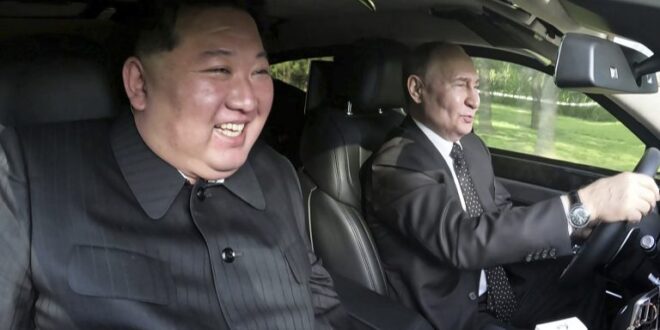Earlier this week, Russian President Vladimir Putin traveled to neighboring North Korea for the first time in over two decades to meet with Kim Jong Un, where the two leaders signed a treaty upgrading their relationship to a strategic partnership which includes promises of military assistance if either is attacked.
Putin’s rare visit to heavily sanctioned North Korea underscores the Kremlin’s changed geopolitical circumstances since its full-scale invasion of Ukraine.
Growing international isolation has pushed the Kremlin to forge closer relationships with North Korea, Iran, and most recently, Cuba, where a fleet of Russian warships, including a nuclear submarine, entered the port of Havana earlier this month for planned military exercises with the Caribbean nation.
Reminiscent of the Cuban Missile Crisis in 1962, the exercises displayed a similar type of Cold War posturing by Russia, as well as Cuba’s appetite to maintain a partnership with the American adversary.
Earlier this week, Russian President Vladimir Putin traveled to neighboring North Korea for the first time in over two decades. North Korean leader Kim Jong Un, accompanied by an honor guard, greeted President Putin on the tarmac as he arrived in Pyongyang to begin the carefully choreographed visit. During the visit, the two leaders signed a treaty upgrading their relationship to a strategic partnership which includes promises of military assistance if either is attacked. The security commitments within the “Treaty on Comprehensive Strategic Partnership,” are based on a now defunct 1961 agreement between North Korea and the Soviet Union.
Since the full-scale invasion of Ukraine, Moscow and Pyongyang have once again found common ground in their opposition to the West and have used this as the basis for strengthening their relationship. Kim and Putin had previously met in September of last year in eastern Russia, where Kim reaffirmed his support for Russia’s invasion of Ukraine. Western intelligence agencies now assess Pyongyang is one of Russia’s key foreign weapons suppliers alongside Iran, another pariah state that Russia has deepened its relationship with since its failed march on Kyiv more than two years ago.
Fragments of ballistic missiles supplied by both Iran and North Korea have now been found amongst the rubble in Ukrainian cities following Russian airstrikes. In exchange for the much-needed munitions, Russia is believed to have agreed to provide food and energy relief as well as technical assistance on defense research. For Kim, hosting the leader of a permanent UN Security Council member state and former member of the G8 is an invaluable source of international and domestic propaganda.
Putin’s rare visit to heavily sanctioned North Korea underscores the Kremlin’s changed geopolitical circumstances since its full-scale invasion of Ukraine. In many ways, Russia has become somewhat of a junior partner to China, with Moscow’s military humbled in Ukraine and its economy hobbled by biting sanctions. Even the aborted mutiny by Yevgeny Prigozhin and the Wagner Group last June demonstrated a vulnerability many had not seen in Russia since the early 1990s, following the collapse of the Soviet Union. Putin has always been extremely image conscious, and so the Kremlin’s recent public relations tour could be intended to send the message that Russia remains strong in the face of the geopolitical setbacks that Moscow has faced over the past several years.
Over the past decade, President Putin’s ideology steadily shifted from suspicion of the West to outright opposition to it. He is now more isolated than ever from large parts of the international community. This has driven the Kremlin to forge closer relationships with other rogue states, such as North Korea, Iran, and most recently, Cuba. A fleet of Russian warships, including a nuclear submarine, entered the port of Havana earlier this month for five days of planned military exercises with the Caribbean nation.
Though the ships did not contain any nuclear weapons, and therefore did not pose a real threat, the exercises appeared to serve the purpose of flexing Russia’s muscles to the U.S., especially following President Joseph Biden’s recent approval for Ukraine to use U.S. arms to strike targets on Russian territory. Reminiscent of the Cuban Missile Crisis in 1962, the exercises displayed a similar type of Cold War posturing by Russia, as well as Cuba’s appetite to maintain a partnership with the American adversary.
It has been estimated that there have been hundreds to thousands of Cubans who have enlisted to fight for Russia in Ukraine to escape the poverty-ridden country. The contracts offer a salary of around $2,000, a number far higher than they would be able to earn in Cuba. Social media has been a popular medium for recruitment, in and out of Cuba, particularly Facebook. According to research by the BBC, in the second half of 2023, several Cuban males posted Russian propaganda, as well as photos of themselves in Russian military uniforms; some even list Russia as their country of residence. Though mercenary recruitment is banned in Cuba, a Russian recruitment ring was busted in September, according to the Cuban government. As over 50,000 Russian troops have died since the invasion of Ukraine in 2022, it is clear that Cuba is one of many disadvantaged populations being taken advantage of by Russia to fill the holes in its front lines.
 Eurasia Press & News
Eurasia Press & News


